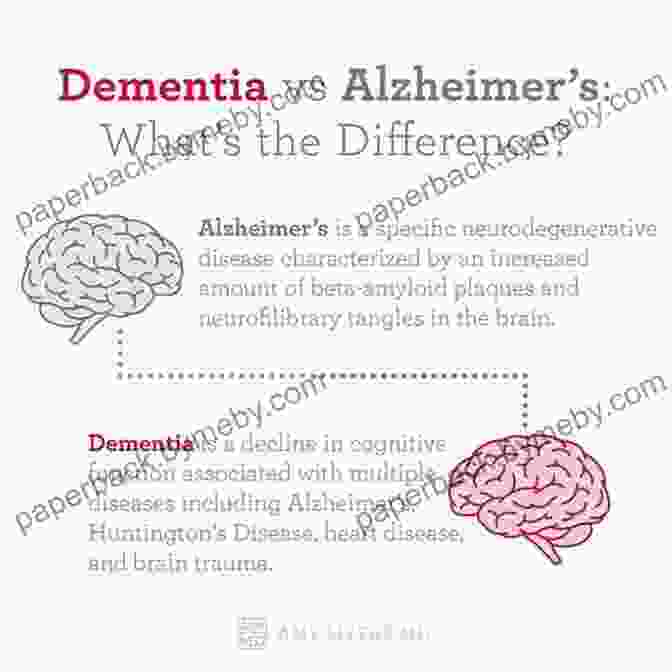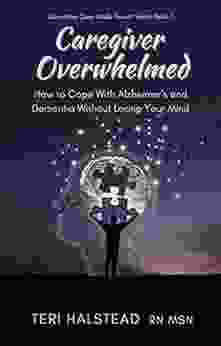Navigating Alzheimer's and Dementia: A Comprehensive Guide to Maintaining Well-being and Clarity


Understanding the Complexities of Alzheimer's and Dementia
Alzheimer's disease and dementia are progressive neurodegenerative conditions that significantly impact the brain and cognitive functions. While Alzheimer's is the most common form of dementia, various other types exist, each with its unique characteristics. Understanding the distinctions between these conditions is crucial for effective care and support.
4.8 out of 5
| Language | : | English |
| File size | : | 1761 KB |
| Text-to-Speech | : | Enabled |
| Screen Reader | : | Supported |
| Enhanced typesetting | : | Enabled |
| Word Wise | : | Enabled |
| Print length | : | 120 pages |
| Lending | : | Enabled |
- Alzheimer's Disease: A progressive and irreversible decline in cognitive abilities, primarily affecting memory, language, and reasoning.
- Vascular Dementia: Caused by reduced blood flow to the brain due to stroke or other vascular problems.
- Lewy Body Dementia: Characterized by abnormal protein deposits in the brain, leading to a combination of cognitive, movement, and sleep issues.
- Frontotemporal Dementia: Impacts personality, behavior, and language due to degeneration in the frontal and temporal lobes of the brain.
Coping with the Challenges
Caring for an individual with Alzheimer's or dementia can be physically, emotionally, and financially demanding. However, with the right strategies and support, it is possible to navigate these challenges and maintain the well-being of both the affected individual and the caregiver.
Emotional Support:
* Join support groups and connect with others facing similar experiences. * Seek professional counseling to process emotions and develop coping mechanisms. * Encourage open and honest communication to build trust and understanding.
Physical Care:
* Ensure a balanced diet, regular exercise, and adequate sleep. * Monitor medications and consult with healthcare providers regularly. * Create a safe and comfortable living environment to minimize risks of falls or accidents.
Cognitive Stimulation:
* Engage in mentally stimulating activities such as reading, puzzles, or reminiscing. * Encourage socialization and interactions with familiar faces. * Use technology, such as assistive devices, to support memory and cognitive function.
Maintaining Personal Identity and Meaning
As the disease progresses, individuals with Alzheimer's or dementia may experience a decline in memory, language, and reasoning abilities. However, it is important to remember that they retain their personal identity and sense of self.
Respect and Dignity:
* Treat the individual with respect and dignity, regardless of their cognitive limitations. * Listen attentively to their thoughts and feelings, even if they are expressed in unfamiliar ways. * Avoid patronizing or infantilizing them; maintain a positive and empathetic attitude.
Preserving Meaningful Connections:
* Create a supportive and loving environment where the individual feels valued and connected. * Involve them in their care and decision-making, as much as possible. * Encourage them to share their memories, stories, and experiences.
Supporting the Caregiver
Caregiving can take a toll on physical, emotional, and mental well-being. It is essential for caregivers to prioritize their own self-care and seek support when needed.
Self-Care and Respite:
* Set aside time for self-care activities that promote relaxation and rejuvenation. * Engage in respite care services, such as adult day care or in-home support, to provide temporary breaks from caregiving responsibilities.
Emotional Support:
* Connect with family, friends, or support groups for emotional support and validation. * Seek professional counseling to process the challenges and develop coping mechanisms. * Remember that you are not alone, and many resources are available to support you.
The Value of Early Diagnosis
Early diagnosis of Alzheimer's or dementia is crucial for accessing appropriate care and support. Delaying diagnosis can lead to missed opportunities for treatment, increased caregiver stress, and diminished quality of life.
Signs and Symptoms:
* Memory loss that impacts daily functioning * Difficulty with language, reasoning, or judgment * Changes in mood, personality, or behavior * Confusion, disorientation, or impaired judgment
Importance of Early Diagnosis:
* Helps plan for future care and support * Allows for access to medications and therapies that may slow disease progression * Reduces the burden on caregivers and promotes a better quality of life
The Promise of Research and Innovation
Ongoing research and innovation offer hope for the future of Alzheimer's and dementia care. Scientists are exploring new treatments, therapies, and diagnostic techniques to improve patient outcomes and support caregivers.
Promising Advancements:
* Development of drugs that target specific disease mechanisms * Non-invasive imaging techniques to detect early signs of the disease * Digital health technologies to support remote monitoring and personalized care
Living with Alzheimer's or dementia can be a challenging journey, but it is not one that has to be faced alone. By understanding the complexities of the disease, embracing coping strategies, supporting the caregiver, and keeping abreast of research advancements, it is possible to navigate this journey with compassion, resilience, and hope. The book "How to Cope with Alzheimer's and Dementia Without Losing Your Mind" provides invaluable insights, practical advice, and emotional support to empower both individuals and caregivers to embrace the challenges and maintain a fulfilling life amidst the complexities of these conditions.
4.8 out of 5
| Language | : | English |
| File size | : | 1761 KB |
| Text-to-Speech | : | Enabled |
| Screen Reader | : | Supported |
| Enhanced typesetting | : | Enabled |
| Word Wise | : | Enabled |
| Print length | : | 120 pages |
| Lending | : | Enabled |
Do you want to contribute by writing guest posts on this blog?
Please contact us and send us a resume of previous articles that you have written.
 Book
Book Novel
Novel Page
Page Chapter
Chapter Text
Text Story
Story Genre
Genre Reader
Reader Library
Library Paperback
Paperback E-book
E-book Magazine
Magazine Newspaper
Newspaper Paragraph
Paragraph Sentence
Sentence Bookmark
Bookmark Shelf
Shelf Glossary
Glossary Bibliography
Bibliography Foreword
Foreword Preface
Preface Synopsis
Synopsis Annotation
Annotation Footnote
Footnote Manuscript
Manuscript Scroll
Scroll Codex
Codex Tome
Tome Bestseller
Bestseller Classics
Classics Library card
Library card Narrative
Narrative Biography
Biography Autobiography
Autobiography Memoir
Memoir Reference
Reference Encyclopedia
Encyclopedia Kevin Gibson
Kevin Gibson Ken Kocienda
Ken Kocienda Rebel Girls
Rebel Girls Elizabeth Nakamura
Elizabeth Nakamura Stephen Batchelor
Stephen Batchelor Tom Geng
Tom Geng Kenneth Laws
Kenneth Laws Ken Goudsward
Ken Goudsward My Little Eye Press
My Little Eye Press Kevin Poulsen
Kevin Poulsen Margaret Leslie Davis
Margaret Leslie Davis Lee Jacquot
Lee Jacquot Kent Lester
Kent Lester Ken Rossignol
Ken Rossignol Kimberly Kessler
Kimberly Kessler S D Nelson
S D Nelson Kevin Rafferty
Kevin Rafferty Kevin Lane Dearinger
Kevin Lane Dearinger Mathai Joseph
Mathai Joseph Stef Smulders
Stef Smulders
Light bulbAdvertise smarter! Our strategic ad space ensures maximum exposure. Reserve your spot today!

 Chase SimmonsDive into the Unstoppable Fury of King Shark in the Thrilling "Suicide Squad:...
Chase SimmonsDive into the Unstoppable Fury of King Shark in the Thrilling "Suicide Squad:...
 Jacob FosterMater and the Easter Buggy Disney Storybook Ebook: A Fun-Filled Adventure for...
Jacob FosterMater and the Easter Buggy Disney Storybook Ebook: A Fun-Filled Adventure for...
 Russell MitchellGateway to the Himalayas: Discover the Enchanting Charms of Himachal Pradesh
Russell MitchellGateway to the Himalayas: Discover the Enchanting Charms of Himachal Pradesh Samuel Taylor ColeridgeFollow ·10.7k
Samuel Taylor ColeridgeFollow ·10.7k Cody BlairFollow ·9.4k
Cody BlairFollow ·9.4k David BaldacciFollow ·10.2k
David BaldacciFollow ·10.2k Wesley ReedFollow ·11.2k
Wesley ReedFollow ·11.2k Wade CoxFollow ·2.3k
Wade CoxFollow ·2.3k Anthony BurgessFollow ·17.8k
Anthony BurgessFollow ·17.8k Stanley BellFollow ·13.1k
Stanley BellFollow ·13.1k Herbert CoxFollow ·14.8k
Herbert CoxFollow ·14.8k

 Isaac Asimov
Isaac AsimovEmbark on an Epic Adventure: The Colorado Trail 9th...
Unveiling the Treasures of the Colorado...

 Clinton Reed
Clinton ReedUltimate Football Heroes: Uncover the Gridiron Greatness...
Enter the World...

 Ibrahim Blair
Ibrahim BlairUnveiling the Secrets of Stolen Focus: A Journey to...
In today's relentless digital...

 Colt Simmons
Colt SimmonsRediscover the Founding Father's Vision: Thomas Jefferson...
Immerse Yourself in the Unedited Words of...

 Juan Butler
Juan ButlerExcel in Language Learning: The Ultimate Self-Study...
Unlock Your Language Potential with Our...
4.8 out of 5
| Language | : | English |
| File size | : | 1761 KB |
| Text-to-Speech | : | Enabled |
| Screen Reader | : | Supported |
| Enhanced typesetting | : | Enabled |
| Word Wise | : | Enabled |
| Print length | : | 120 pages |
| Lending | : | Enabled |








